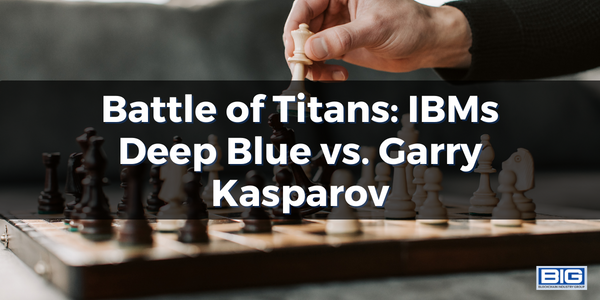
IBM Deep Blue was a computer system specifically designed to play chess. It consisted of a number of hardware and software components that worked together to analyze chess positions and select the best moves.
At the heart of Deep Blue was a custom-designed chess-specific computer chip called the VLSI Chip. This chip was capable of analyzing up to 200 million chess positions per second, which was significantly faster than any previous chess-playing computer.
In addition to the VLSI Chip, Deep Blue also used a database of previously played chess games to inform its decisions. It used artificial intelligence techniques such as brute-force calculation, where it would analyze all possible move combinations, and heuristics, where it would use rules of thumb to guide its search for the best move.
Deep Blue also had access to up to 512 MB of memory, which it used to store information about the current chess position and its search for the best move. This allowed it to “think” deeper and more extensively about each position than its human opponents.
Garry Kasparov is widely considered one of the greatest chess players of all time. He was born in Azerbaijan in 1963 and began playing chess at a young age. Kasparov became the youngest World Chess Champion in history in 1985 at the age of 22. He held the title until 2000, during which time he was known for his aggressive, attacking style of play and his intense focus and preparation. Kasparov has a number of notable achievements to his name, including winning the World Chess Championship five times, the Chess Olympiad four times, and the Linares chess tournament a record nine times. In addition to his success on the chessboard, Kasparov has also been an influential figure in politics and has been an outspoken critic of Russian President Vladimir Putin.
The battle between IBM Deep Blue and Garry Kasparov was a highly publicized chess match that took place in 1997. Deep Blue was a chess-playing computer developed by IBM, while Kasparov was the reigning World Chess Champion at the time. The match consisted of six games, with Kasparov winning the first match 4-2, and Deep Blue winning the rematch 3½-2½.
The match attracted a great deal of attention, both within the chess world and beyond, as it pitted one of the greatest chess players of all time against a machine that was specifically designed to play chess. The games were closely contested, with Kasparov and Deep Blue both displaying their formidable chess skills. In the end, Deep Blue emerged victorious, winning the rematch 3½-2½. The match was seen as a significant milestone in the field of artificial intelligence and demonstrated the capabilities of computers to outperform humans in certain tasks.
After its victory over Kasparov, Deep Blue was retired from competitive play and is now on display at the Computer History Museum in Mountain View, California.
As for Kasparov, he continued to play and excel at chess after his defeat by Deep Blue. He won the FIDE World Chess Championship in 2000, and remained one of the top-ranked chess players in the world until his retirement from professional play in 2005. Since retiring from chess, Kasparov has become a political activist and writer.
Monetizing AI: 10 Strategies for Early Adopters
—
OpenAI, Elon Musk, DALL-E and ChatGPT
—
Pros and Cons of Universal Basic Income
The match between Deep Blue and Garry Kasparov was an important moment in the history of artificial intelligence and chess. It was the first time that a computer had defeated a world chess champion in a match of several games, and it marked a significant milestone in the development of computer chess programs. The match also attracted a great deal of media attention and public interest, as it pitted the best human player against the best computer player in a high-profile battle of man vs. machine. From a broader perspective, the match symbolized the growing power and capabilities of artificial intelligence, and it raised questions about the potential future role of machines in society. Overall, the match between Deep Blue and Kasparov was a significant event that had an impact on the fields of AI and chess, and it is remembered as a turning point in the history of both.



